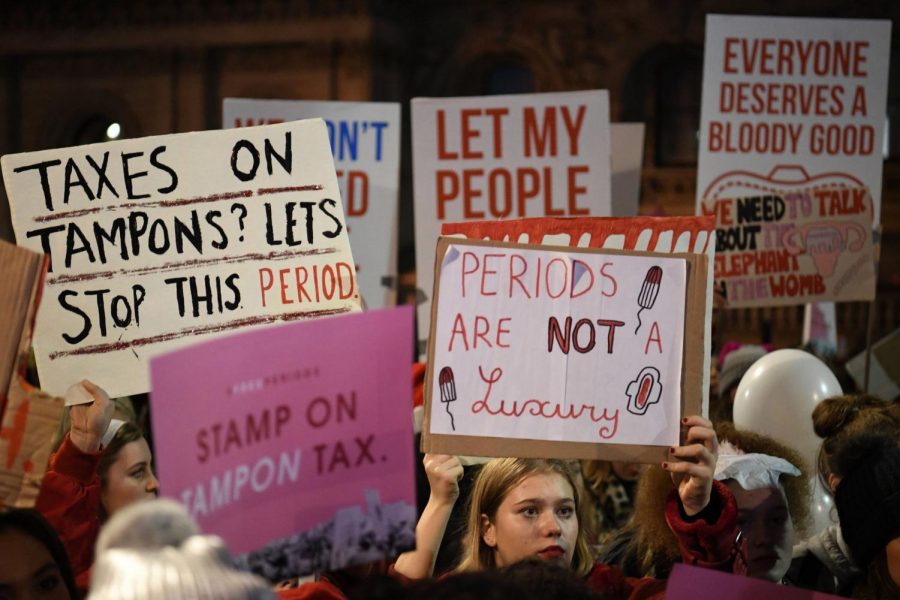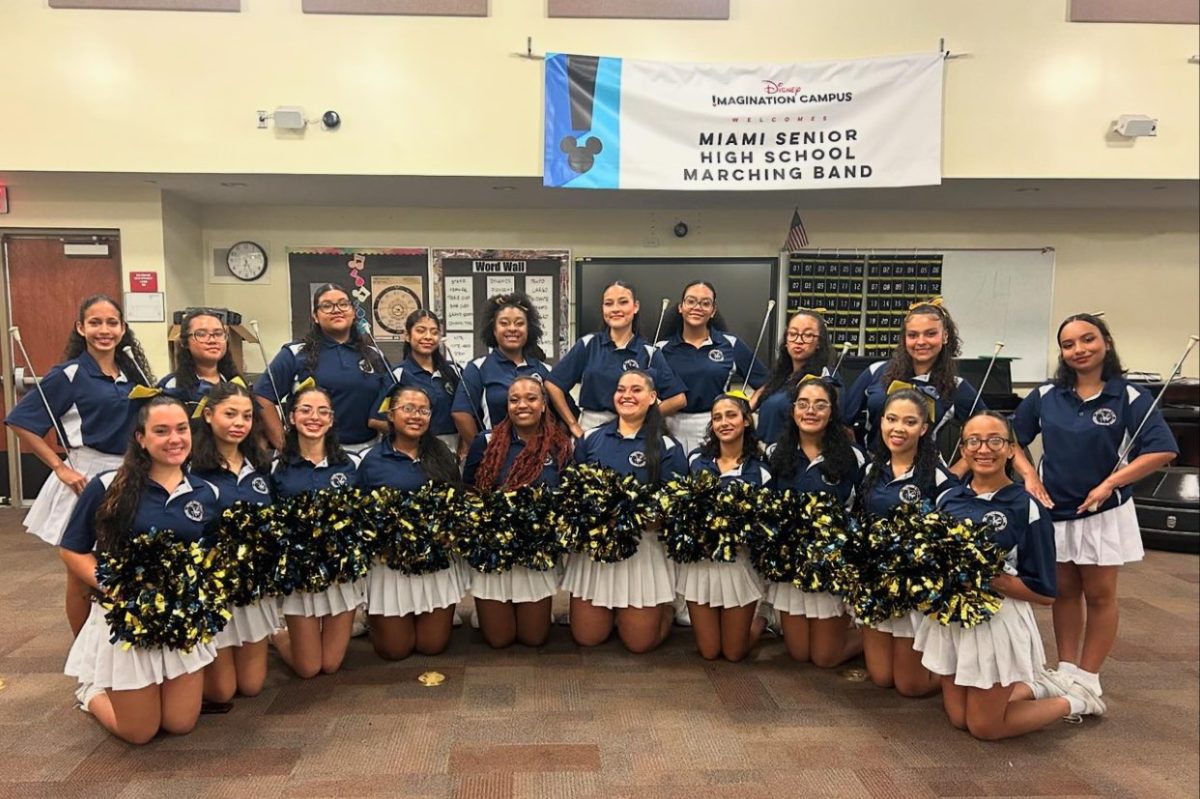Menstrual Products: A Right, Not Privilege
April 1, 2020
When you think of necessities, you think of soap, toothpaste, deodorant, razors and so on. Vital necessities that women require to make it through their monthly menstrual cycle include pads, tampons, liners, or menstrual cups. While they are human necessities, these products do have a monthly fee that are often ignored. They are taxed and on top of that, women in poverty and low economic status go through a monthly struggle to manage their cycle.
Is it hard to afford menstrual products?
Whether it’s pads, tampons, liners, or menstrual cups, all types of menstrual products come with a price. These products do add up in monthly budgets and at times can be difficult for young girls to buy.
Junior Arianna Solis said, “There have been months where my family has been running short on money and to ask for these products has felt like a burden.”
Senior Thais Maradiaga switched to a menstrual cup because the cost of buying tampons every month started piling up. “While buying tampons was never inaccessible for me, it was definitely a significant expense,” she said.
On the other hand, for senior Emma Alonso it is not hard for her to buy menstrual products.
School’s 25 cent Policy
In Miami High, when someone gets their menstrual cycle during the middle of a lecture in class they either have to ask someone in hopes of them having a pad or they are forced to pay 25 cents. Imagine a world where you’d have to pay 25 cents every time you used toilet paper in a public restroom.
Junior Shayla Garcia said, “If schools really cared about providing for their students, then they shouldn’t require them to pay for a necessity. I’ve seen how these machines aren’t even stocked up with these products. Also it’s already hard enough to get the school nurse to lend you a pad.”
Senior Sharon Lazzara said most of us don’t have jobs and we look to our school, the place we are in just as often as our homes, to provide us with what we need. “Instead we are confronted with a price tag that depletes our pockets even further,” she said.
Senior Lucy Severo said, “Students get their periods all the time during a school day and having to pay for a pad is exclusionary. Youth shouldn’t be penalized or forced to pay for something they can’t control.”
11th grade counselor Ms. Gottlieb wonders whether the government would fund these products. “The money schools receive comes from the government, so if there are no funds that are budgeted for these products, how is the school going to pay for it?” she asked.
Should menstrual products be free?
On average monthly expenses for period products range from $7-$20 depending on the women’s flow and brand they purchase from. That is almost $300 per year, and throughout a woman’s reproductive lifetime, it is thousands of dollars. That is excluding pills such as Advil, packs of tea bags and heating pads to manage period cramps.
Some argue that these necessities should be given for free. Junior Kiara Delgado believes women should not be punished for having bodies. “It happens every month and we shouldn’t be paying obscene amounts of money for something completely natural. I don’t spend nearly as much money on toothpaste as I do with menstrual products, and I brush my teeth far more than I get my period,” she said.
According to Christiana Littrell, a representative of the nonprofit organization, I Support The Girls, Which collects donations of new and gently used bras and individually sealed tampons and maxi pads and distributes them to women experiencing homelessness, “In an ideal world, the U.S. would adopt the Scottish model–free menstrual products for all.” She referred to the Scottish lawmaker Monica Lennon that said menstruation is normal and that free universal access to tampons, pads and reusable options should be normal, too. “Until the U.S. follows in Scotland’s footsteps, we believe it’s critical that all 50 U.S. states remove the tampon tax. We advocate for free menstrual products in all public places like federal buildings, libraries, and schools,” Christiana said.
Law teacher Ms. Perez said we have to understand where that money would be coming from. That it most likely would have to be provided by taxes. “Because we live in a democratic country, we’d have to first vote and see if our citizens would be okay with giving a few extra cents per pay check towards this cause,” she said.
She personally would completely be okay with it. She thinks this is a huge issue, especially in homeless societies, since they aren’t provided with the care. “I personally think some women might be a bit more picky and like certain brands so if they want that, then that’s where they’d have to pay,” she said.
On the other hand, senior Anthony Montenegro believes menstrual products should not be free because it would only decrease the quality of these needed products, which in turn, would only harm the women that need them.
Why are menstrual products expensive?
Menstruation products are known to be expensive. On top of that, at times, some of the packs of tampons and pads do not come with nearly enough product to last some women throughout their cycle. Senior Keilyn Delgado feels it might be due to the lack of concern and knowledge. “If men, who are typically the policy makers, knew how much we needed these products, maybe there would be more compassion towards women’s intimacy products,” she said.
Senior Elizabeth Vasquez said, “It’s simple. Capitalism. Companies capitalize on the demand for menstrual products. Unfortunately, some women must choose to get creative and would go as far as using a cloth and washing it a few times in order to reuse it since they cannot afford pads or tampons. Menstruation is a normal cycle women did not ask for. It shouldn’t be capitalized for profit.”
The Tampon Tax
In 30 states there is a tax on menstrual products called the tampon tax. However, states such as Alaska, Florida, California, Connecticut, Delaware, Illinois, Massachusetts, Maryland, Minnesota, New Hampshire, New Jersey, New York, Nevada, Ohio, Oregon, Pennsylvania, Rhode Island, and Utah have been declared tax free.
Just recently according to The Period Movement, a non profit organization which distributes tampons, pads and menstrual cups for those in need, run educational workshop to educate people on periods and fight for systematic change towards menstrual equity, the bill SB5147 in the state of Washington has passed, which means the state has taken down their tampon tax.
Junior Jose Torrentes believes the tax is a form of gender segregation, for it taxes women on their necessities. “It’s unjust and leaves economic burden on women for being women,” he said.
Thais Maradiaga said, “The tax exacerbates inequity and accessibility. There are people who have to stay home from work or school during their periods because their socioeconomic status inhibits them from accessing sanitary products.”
Should men be more educated on menstrual products?
Growing up, women have to understand menstrual products. While some men have an understanding of menstrual products, there are boys, especially in high school, who don’t know what these products are.
Kiara Delgado said men should take the time to at least try to comprehend what menstruation is and what it demands of those who have ovaries. “Especially in a climate where men make borderline sexist jokes about periods and the worst part is that they don’t recognize their sexism because it is so deeply ingrained in our system. Knowing about these products would help us empathize with each other rather than ostracize each other for being on nature’s cycle. It’d also be wonderful if our male teachers were educated to the millions of people who go through periods as there are many cases of male teachers denying their students the right to the bathroom or publicly shaming them for a process they can’t choose to be a part of,” she said.
Anthony Montenegro believes that, although men can’t use menstrual products, it’s still worthwhile to learn about them. “Mainly to teach menstrual cycles aren’t gross,” he said. However, he thinks this type of education is something that should be taught at homes rather dedicating an entire class to periods.
On the contrary, senior Jesse Gonzalez said men shouldn’t be educated on these products because they’re not the ones using them.
Raise Awareness
Period poverty is a real issue. Homeless women are forced to choose between using the few dollars they have collected from panhandling for their menstrual products or something to eat.
According to the nonprofit organization, Days for Girls, that assist women in over 100 countries in orphanages with menstrual products. Around the world, homeless women resort to using rags, cardboard, mattress stuffing, banana leaves, feathers, and even cow dung to manage their menstruation.
The Volunteer Affiliate Director for the South Florida chapter of I Support The Girls, Kathryn Spino, said the best way to get the word out is to be an advocate to everyone.
“Look for social media groups that may provide products and services and let them know your needs and share their information with your groups to get the word out there. Contact your school principal and ask for a closet at school to create a “Hygiene Pantry” where students can get products when needed. Reach out to women’s organizations and clubs and ask them to sponsor a “drive” to help you get product donations,” she said.
Period Facts
- 1 in 4 women have struggled to afford period products.
- 1 in 5 low income women have missed work, school or similar events due to lack of access to period supplies.
- 46% of low-income women had to choose between a meal and period products.
- State and federal safety-net programs cannot be used to purchase period supplies.
Sources: www.allianceforperiodsupplies.org, www.period.org







